英语人教版八年级下册U5
人教版英语八年级下册U5短语(完整版)
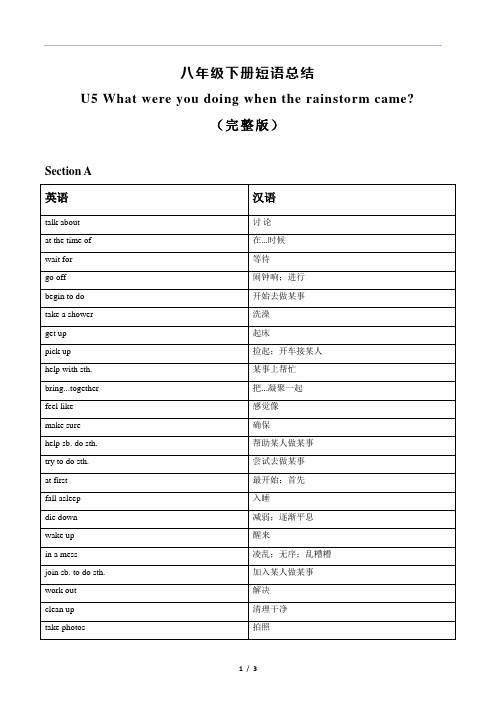
walk by
路过
at that time
在那时
the rest of ...
其余的...
in silence
默默地
take down
拆除;炸毁
have/has meaning to sb.
对某人有意义
be shocked to do sth.
很震惊去做某事
tell the truth
说实话
洗澡
get up
起床
pick up
捡起;开车接某人
help withsth.
某事上帮忙.凝聚一起
feel like
感觉像
make sure
确保
help sb. do sth.
帮助某人做某事
try to do sth.
尝试去做某事
at first
最开始;首先
fall asleep
八年级下册短语总结
U5What were you doing when the rainstorm came?
(完整版)
Section A
英语
汉语
talkabout
讨论
at the time of
在...时候
wait for
等待
go off
闹钟响;进行
beginto do
开始去做某事
take a shower
more recently
更近的时期
look out of the window
望向窗外
so ... that ....
如此...以至于...
think clearly
清楚地思考
stop doing sth.
Unit5+单词讲解课件+2022-2023学年人教版英语八年级下册
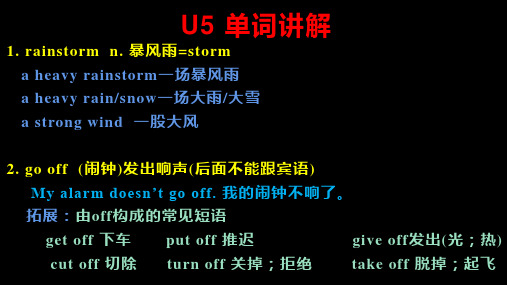
● 5. suddenly adv. 突然;忽然 ● 放在句首,用逗号隔开; ● sudden adj. 突然的 ;忽然的 ● sudden+ly=suddely
19. have a look 看一看(=take a look=look) ①have/take a look at sth/oneself看.... ② look n. 表情 the look of joy on their owners’ faces他们脸上的幸福的表情
20. kid v. 开玩笑;欺骗 ①kid--kidded--kidding v. 开玩笑 Don’t be nervous. I was just kidding just now. ②kid---kidded---kidding v. 欺骗=cheat
14. against prep. ①碰;撞;倚;靠着 The rain beat against the car windscreen. against the wall ②反对;反义词for be against sb/sth反对某人、某事 be for sb/sth支持某人、某事
15. fall asleep 进入梦乡; 睡着
22. make one’s way to sp....前往...;费力地向...前进。 拓展:way 的短语
lose one’s way 迷路 by the way 顺便问一下 in the/one’s way 挡道;妨碍
人教版英语八年级下册U5单词及重点归纳

人教版英语八年级下册 U5 单词及重点归纳
unit5 单词(音标)
rainstorm [ ? re ? nst ? :m] n. 暴风雨
alarm [ ? ? l ɑ:m] n. 闹钟
go off ( 闹钟 ) 发出响声
begin [b ? ? g? n] v. 开始
heavily [ ? hev ? li] adv. 在很大程度上,大量地
历史上的重大事件
23.for example 例如
24.be killed 被杀害
3
人教版英语八年级下册 U5 单词及重点归纳
4
25. over 50 50
多( 岁)
26. a school pupil
一个小学生
27. on the radio
通过广播
28.in silence 沉默 ; 无声
29.more recently 最近地 ; 新近
shocked [ ? ? kt] adj. 震惊的,震撼的
silence [ ? sa? l ? ns] n. 寂静,沉默
in silence 沉默,无声
recently [ ? ri:sntli] adv.
不久前,近来,最近
take down 拆除,往下拽,记录
terrorist [ ? ter ? r ? st] n. 恐怖分子
30.the World Trade Center
世贸中心
31.take down 拆除 ; 摧毁
32.have meaning to 对……有意义
33.remember doing sth. 记得做过某事
34.at first
首先 ; 最初
【重点句型】
英语人教版八下5单元课件
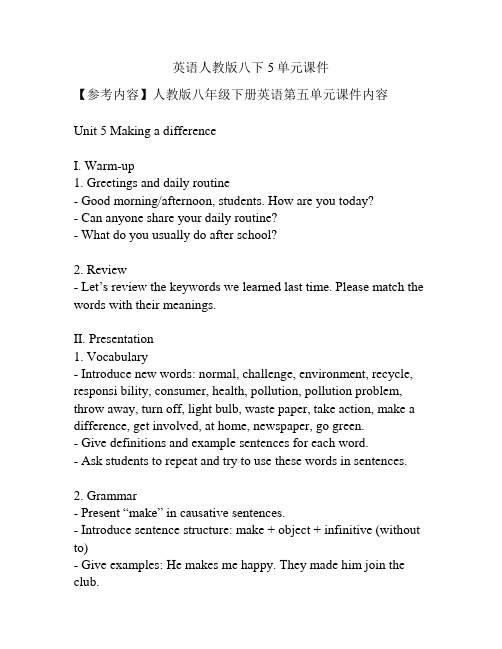
英语人教版八下5单元课件【参考内容】人教版八年级下册英语第五单元课件内容Unit 5 Making a differenceI. Warm-up1. Greetings and daily routine- Good morning/afternoon, students. How are you today?- Can anyone share your daily routine?- What do you usually do after school?2. Review- Let’s review the keywords we learned last time. Please match the words with their meanings.II. Presentation1. Vocabulary- Introduce new words: normal, challenge, environment, recycle, responsi bility, consumer, health, pollution, pollution problem, throw away, turn off, light bulb, waste paper, take action, make a difference, get involved, at home, newspaper, go green.- Give definitions and example sentences for each word.- Ask students to repeat and try to use these words in sentences. 2. Grammar- Present “make” in causative sentences.- Introduce sentence structure: make + object + infinitive (without to)- Give examples: He makes me happy. They made him join the club.- Ask students to create their own sentences using the structure. III. Practice1. Listening- Listen to a passage about a group of students making a difference. - Answer the questions based on the passage.2. Speaking- Discuss in pairs: What can we do to make a difference?- Share the ideas with the whole class.3. Reading- Read a passage about a teenager who is making a difference.- Match the paragraphs with the main topics.4. Writing- Write a short paragraph about what you do to make a difference. - Share your paragraph with the class.IV. Review and extension1. Vocabulary review- Recapitulate the new words using flashcards and ask students to explain their meanings.- Have a quick quiz to check understanding.2. Role-play- Divide students into groups of three or four.- Each group prepares a role-play about making a difference in their community.- Perform the role-play in front of the class.3. Video/Online resources- Watch a video or explore online resources about famous environmentalists who have made a difference.- Discuss in groups: How have they made a difference?- Share your findings with the class.V. Homework1. Write a short essay about what you can do to make a difference in your community.2. Prepare a presentation to share with the class about a famous environmental activist.3. Preview Unit 6 vocabulary words.。
人教版英语八下第五单元课文

人教版英语八下第五单元课文The unit 5 of the 8th grade English textbook starts with the topic of "Travelling in the Future". The lesson discusses the possibility of different modes of transportation in the future. The students learn about the potential development of futuristic vehicles such as flying cars, high-speed trains, and magnetic levitation trains.The students also study future travel vocabularyincluding "autonomous vehicles", "hoverboards", "hyperloop", and "space tourism". They explore the advantages and disadvantages of each mode of transportation and discusstheir opinions on which mode they think will be the most popular in the future.In addition to transportation, the lesson also touches on the topic of futuristic accommodation. The students learnabout the concept of "space hotels" and how they might be designed and constructed.The lesson aims to inspire students to think creatively about the future and to use their imagination to predict what the world might look like in the coming years. It encourages students to discuss and debate their ideas about futuretravel and accommodation, and to consider the potential impact of these developments on society and the environment.。
人教版八年级英语下册Unit 5 What were you doing when the rain
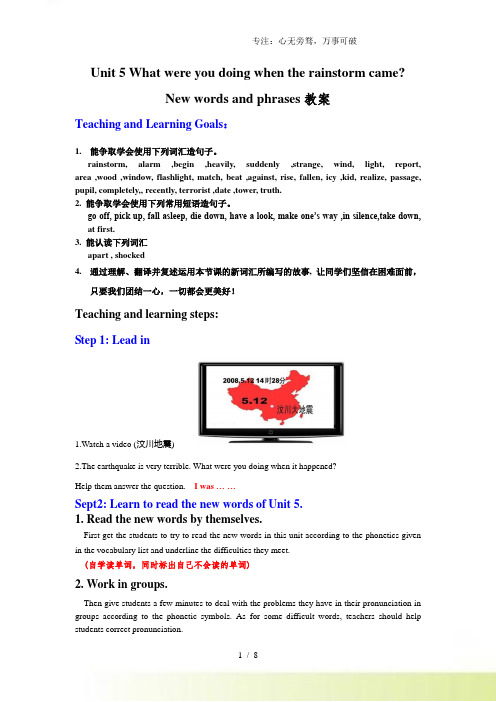
Unit 5 What were you doing when the rainstorm came?New words and phrases教案Teaching and Learning Goals:1.能争取学会使用下列词汇造句子。
rainstorm, alarm ,begin ,heavily, suddenly ,strange, wind, light, report, area ,wood ,window, flashlight, match, beat ,against, rise, fallen, icy ,kid, realize, passage, pupil, completely,, recently, terrorist ,date ,tower, truth.2. 能争取学会使用下列常用短语造句子。
go off, pick up, fall asleep, die down, have a look, make one’s way ,in silence,take down, at first.3. 能认读下列词汇apart , shocked4.通过理解、翻译并复述运用本节课的新词汇所编写的故事, 让同学们坚信在困难面前,只要我们团结一心,一切都会更美好!Teaching and learning steps:Step 1: Lead in1.Watch a video (汶川地震)2.The earthquake is very terrible. What were you doing when it happened?Help them answer the question. I was ……Sept2: Learn to read the new words of Unit 5.1. Read the new words by themselves.First get the students to try to read the new words in this unit according to the phonetics given in the vocabulary list and underline the difficulties they meet.(自学读单词,同时标出自己不会读的单词)2. Work in groups.Then give students a few minutes to deal with the problems they have in their pronunciation in groups according to the phonetic symbols. As for some difficult words, teachers should help students correct pronunciation.(小组讨论如何根据音标读单词,初步解决疑难,确有不会的可向老师寻求帮助。
八年级下册人教版英语unit5知识点

八年级下册人教版英语unit5知识点Unit 5 Knowledge Points in Grade 8 of People's Education PressUnit 5 in Grade 8 of People's Education Press English textbook covers a variety of topics. In this article, we will explain the key knowledge points of this unit to help you better understand and learn English.Part 1: Grammar1. The present perfect tenseThe present perfect tense is used to describe past actions or experiences that have a connection to the present. It is formed by using "have/has" and the past participle of the main verb. For example:I have played soccer before. (The action of playing soccer happened in the past, but the speaker's experience of playing soccer has a connection to the present.)2. The past perfect tenseThe past perfect tense is used to describe an action that happened before another action in the past. It is formed by using "had" and the past participle of the main verb. For example:She had finished her homework before she watched TV. (Finishing homework happened before watching TV in the past.)3. Passive voiceThe passive voice is used to show that the subject of the sentence is receiving the action, rather than doing the action. It is formed by using "be" and the past participle of the main verb. For example:The cake was made by Tom. (The subject "the cake" is receiving the action of being made by Tom.)Part 2: Vocabulary1. Adjectives for describing personalitiesIn unit 5, you will learn about various adjectives that can be used to describe personalities, such as:- Confident- Responsible- Outgoing- Shy- Friendly- Creative2. Phrasal verbsPhrasal verbs are idiomatic phrases that consist of a verb and one or more prepositions or adverbs. In unit 5, you will learn about some common phrasal verbs, such as:- Look up (to search for information)- Put on (to wear)- Take off (to remove)- Get along (to have a good relationship with someone)Part 3: Reading and Writing1. Writing a narrative paragraphIn unit 5, you will learn how to write a narrative paragraph, which tells a story or an event. A narrative paragraph should have a clear beginning, middle, and end, as well as detailed descriptions and sensory language to engage the reader.2. Reading comprehension strategiesReading comprehension strategies are techniques that help you better understand what you are reading. In unit 5, you will learn about some important strategies, such as:- Predicting- Visualizing- Summarizing- Asking questions- Making connectionsConclusionUnit 5 in Grade 8 of People's Education Press English textbook covers a diverse range of topics, including grammar, vocabulary, reading, and writing. By mastering the key knowledge points of this unit, you will have a better understanding of English and be able to communicate more effectively.。
英语人教版八下5单元课件
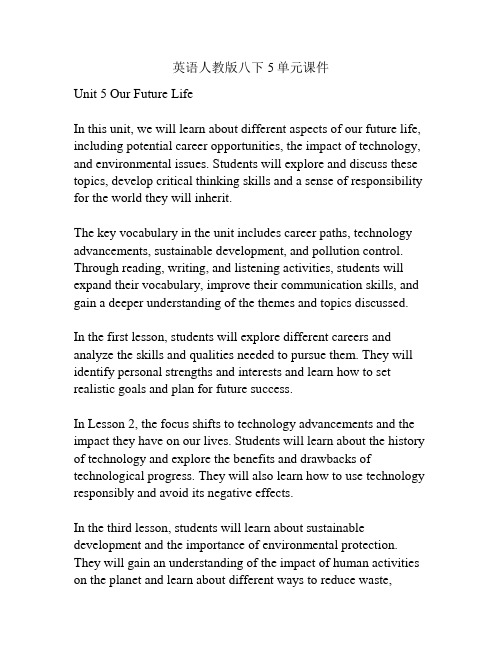
英语人教版八下5单元课件Unit 5 Our Future LifeIn this unit, we will learn about different aspects of our future life, including potential career opportunities, the impact of technology, and environmental issues. Students will explore and discuss these topics, develop critical thinking skills and a sense of responsibility for the world they will inherit.The key vocabulary in the unit includes career paths, technology advancements, sustainable development, and pollution control. Through reading, writing, and listening activities, students will expand their vocabulary, improve their communication skills, and gain a deeper understanding of the themes and topics discussed.In the first lesson, students will explore different careers and analyze the skills and qualities needed to pursue them. They will identify personal strengths and interests and learn how to set realistic goals and plan for future success.In Lesson 2, the focus shifts to technology advancements and the impact they have on our lives. Students will learn about the history of technology and explore the benefits and drawbacks of technological progress. They will also learn how to use technology responsibly and avoid its negative effects.In the third lesson, students will learn about sustainable development and the importance of environmental protection. They will gain an understanding of the impact of human activities on the planet and learn about different ways to reduce waste,conserve resources, and minimize pollution.In the final lesson, students will synthesize their learning by creating a vision for their future life. They will consider their career goals, the role of technology in their lives, and their responsibility to the environment.Throughout the unit, students will engage in dynamic and interactive activities designed to enhance their learning experience. These include group discussions, presentations, research projects, and simulations. By the end of the unit, students will have a deeper understanding of their potential future paths, a sense of responsibility for the environment, and the skills needed to succeed in the changing world.。
人教版八年级下册英语Unit5知识点总结

人教版八年级下册英语Unit5知识点总结一、语法知识点A部分知识点1.过去进行时❶ 去进行时的构成及用法过去进行时由“助动词(was/were)+动词-ing”构成,表示在过去某一时刻或某一时间段正在进行的动作。
这一特定的过去时间除有上下文暗示以外,一般用过去的时间状语来表示。
如:then, at that time, at this time yesterday, at 10:00 yesterday morning, all right以及when/while从句等。
❶ 表示过去时间点正在进行的动作。
此时常伴明确的过去时间点等。
eg:She was reading a book at this time yesterday.昨天这个时候她正在看书。
(过去时间点正在进行的动作)I was watching TV then. 那时我正在看电视。
(过去时间点正在进行的动作)❶ 表示过去的某个阶段持续的动作。
eg:She was watching TV when the phone rang.(过去一段时间内持续的动作)她正在看电视,这时电话铃响了。
❶ 表示这一阶段反复发生的动作,带有褒贬感情色彩。
此时常伴有频度副词always等。
eg:The girl was always changing her mind.(过去反复发生的动作,带有感情色彩)这个女孩老是改变主意。
❶ 表示过去动作延迟到以后发生,即用过去进行表过去将来,此类动词是一些位置的变化的词。
eg:He told me that he was going soon.(过去进行表将来)他告诉我他很快就要走了。
❶ 过去进行时的一般疑问句句型:Be(Was/Were)+主语+现在分词+其他?肯定回答:Yes,主语+be(was/were).否定回答:No,主语+be(was/were) not.eg:--Were you cooking at that time? 那时,你在做饭吗?--Yes, I were.是的。
初中英语人教版八年级下册unit 5

What were you doing when the rainstorm came?
Section A Period One
Words & expressions
rainstorm n. 暴风雨 合成词:名词 +名词n. 闹钟 alarm Read after the tape (闹钟 )发出响声 go off andv. speak 开始 out the begin Chinese immediately. adv.在很大程度上;大量地 heavily suddenly adv. 突然;忽然 pick up 接电话 strange adj.奇特的;奇怪的
Where were the people at the time of the 1a rainstorm? Match the statements with the people in the picture.
a c
b
d
1. ___ I was in the library. 2. ___ I was in my house. 3. ___ I was on the street. 4. ___ I was at the bus stop.
课时重点回顾
1. What was the girl/ boy doing at the were you doing when the rainstorm came? I was…
Preview the new words and expressions. Preview the passage in 3a. 发挥想象,连词成文。(50-100字) strange, rainstorm, suddenly, flashlight, die down, fallen, apart
人教版本英语初中八年级的下unit5讲解及练习.doc

Unit 5 What were you doing when the rainstorm came?Section A1. What were people doing yesterday at the time of the rainstorm.1) 本句为过去进行时态,表示在过去某时间某动作正在发生,由“助动词was/were+v.-ing”。
--- What were you doing at nine yesterday morning?---I was playing in the park.2) at the time of 在 ......的时候What were you doing at the time of the earthquake.2.My alarm didn ’ t go off so I _______ up late.Go off 意为”(闹钟)发出响声The alarm went off at 6:30.A car alarm went off in the middle of the night.3. I ______ to the bus stop but I still missed the bus.我 __________ 到公共汽车候车亭,但我还是没赶上公共汽车。
Hurry up, or you will miss your train.I got up late so I missed the early bus.拓展: 1) miss 作及物动词,意为“想念、思念”2) miss 作及物动词,意为“缺课”4. 。
When the rainstorm suddenly came, what were you doing?1)此处when 作从属连词,意为“当。
时候”,引导时间状语从句,其谓语动词既可以是非延续性动词,也可以是延续性动词,谓语动词动作发生的时间可以与主句的谓语动词的动作是同时、之前后之后。
八年级人教版U5知识点

八年级人教版U5知识点第一部分:Introduction八年级人教版U5知识点是学习英语语言的必要内容,是中学英语综合性能力的重要组成部分。
本篇文章将从以下几个方面来介绍八年级人教版U5的知识点。
第二部分:Grammar八年级人教版U5的语法知识点主要包括以下几个方面:1. 过去进行时过去进行时表示过去某个时间正在进行的动作或状态,常与过去的简单时态连用。
例如:- I was studying English when my sister came in.- They were playing basketball at six yesterday evening.2. 现在完成时现在完成时表示过去发生的动作对现在的影响,或者过去某个时间开始持续到现在还在进行的动作或状态。
例如:- I have visited London twice.- He has been working in this company for five years.3. 用于建议和命令的虚拟语气用于建议和命令的虚拟语气常用“should”或“would”加动词原形表示。
例如:- You should take a break.- Would you please close the window?第三部分:Vocabulary八年级人教版U5的词汇知识点主要包括以下几个方面:1. 表达母亲的词汇mother, mom, momma, mommy, mum, mama, ma2. 表达节假日的词汇holiday, festival, vacation, celebration, Christmas, Easter, Halloween3. 表达颜色的词汇red, orange, yellow, green, blue, purple, pink, brown, black, white第四部分:Reading八年级人教版U5的阅读理解主要包括以下几个方面:1. 阅读短文选择正确答案要求学生根据短文内容选择正确的答案。
初中英语人教版八年级下册unit5

Unit 5 What were you doing when the rainstorm came?Section B Do you remember what you were doing?教学目的和要求1.重点单词:passage,pupil,completely,silence,recently,Terrorist,date,tower ,realize2.重点短语:in history, in silence,take down,at first,Look out of the window1.重点句子:People often remember what they were doing when they heard the news of important events in history.My parents were completely shocked!Even the date-September 11,2001-has meaning to most Americans.She remembers working in her officenear the two towers.I didn’t believe him at first,but then I looked out the window andrealized that it was true.I was so scared that I could hardly think clearly after that .教学重点1.重点短语和句型2.利用所学知识谈论过去发生的事情3.培养阅读技巧从标题和段落第一句话获取信息。
教学难点1.利用所学知识谈论过去发生的事情2.培养阅读技巧从标题和段落第一句话获取信息教学过程一、看图猜生词二、完成2bLook through the passage , then answer the questions.略读文章,然后回答问题。
人教版八年级英语下册Unit 5 课件
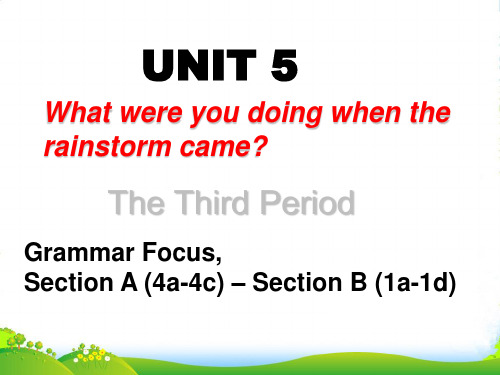
b: 表示过去某段时间内正进行的动作。 e.g. 我们去年冬天在建房子。 We were building a house last winter. 否定句和疑问句: e.g. 我们(那会)没有在家睡觉。 We were not sleeping at home.
4. I met a good friend of mine while I ____ on the street.
A. walks B. walk C. was walking D. am语从句 1) 延续性动词和非延续性动词
延续性动词指动作可以延续一段时间, 而不 是瞬间结束。
4. 她正在做家庭作业。 She w__a_s_ _d_o_in_g__ her _h_o_m_e_w__o_r_k.
5. 在暴风雨来临的时候他正在做什么? What _w_a_s_ he _d_o_i_n_g_ when the _r_a_in_s_t_o_r_m_ __c_a_m_e__?
6. 当暴风雨来临的时候她正在图书馆读书。 She w__a_s_r_e_a_d_in_g_ in the library when the rainstorm _c_a_m_e_.
现在进行时
含义: 表示现在 正在进行的动作。
结构: is/am/are + doing
例句:
I am having an English class.
过去进行时
含义: 表示过去某个时刻 正在进行的动作。
结构: was/were + doing
例句:
I was having an English class at this time yesterday.
人教版英语八年级下册 Unit 5 课文解读(含单词、短语等)
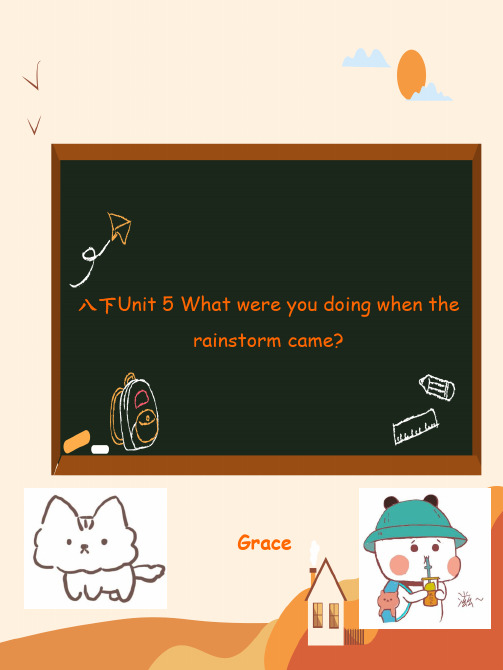
4. match
n. [C] 火柴;比赛 v. 匹配;相配
5. beat 6. heavily 7. against
v. 敲打;打败;(心脏)跳动 (beat-beat-beaten) n. 节奏 beat sb. vs win sth. e.g. beat him/beat the team/beat Class 5 e.g. win the match; win the first place/prize
by the way 顺便说一下 on the/one’s way to 在去……的路上 in the/one’s way 挡路;妨碍 in a way 在某种程度上
8. truth
n. 真相;实情 tell the truth 说实话 true adj. --- truly adv.
英语人教版八年级下册U5

the competition started… got to the bus stop …
…
wanted to call Animal Helpline…
running back home …
A: Kate left her house late . B: When the school basketball competition started, Kate was still making her way to school. C: When she got to the bus stop, she… D: While…
running back home …
A: What did she realize when she got to the bus stop? B: When she got to the bus stop ,she …
Talk about why Kate missed the school Basketball competition?
1d
left her house late
According to the conversation , ask and answer in pairs .
the competition started… got to the bus stop …
…
wanted to call Animal Helpline…
4 ____ 2 ____ 6 ____ ____ 1 ____ 5 3 ____
Listen and try to follow and imitate the conversation . ( P101 )
- 1、下载文档前请自行甄别文档内容的完整性,平台不提供额外的编辑、内容补充、找答案等附加服务。
- 2、"仅部分预览"的文档,不可在线预览部分如存在完整性等问题,可反馈申请退款(可完整预览的文档不适用该条件!)。
- 3、如文档侵犯您的权益,请联系客服反馈,我们会尽快为您处理(人工客服工作时间:9:00-18:30)。
2a Look at the pictures and the title in the passage. What do you think the passage is about?
Do You Remember What You Were Doing?
Reading skills
Read the title and first Sentences.
2. When did they happen?
The first event happened on April 4, 1968. The second event happened on September 11, 2001.
Task 2
2c Read the passage again. Are the following statements true (T) or false (F), or is the information not given (NG)?
(Paragraph 4)
This was a day Kate Smith will never forget. She remembers working in her office near the two towers. “My friend shouted that a plane just hit the World Trade Center! I didn‟t believe him at first, but then I looked out the window and realized that it was true. I was so scared that I could hardly think clearly after that.”
a
We ___ ___ ______in the kitchen when we heard the news on the radio
4.我吓坏了,事后脑子里一片茫然。 I was ___ ____that I could hardly ____ _____after that. 5.甚至日期---2001年9月11日---对大多数美国人来说都有意义。 .Even the date—September 11, 2001-- ____ ________ _____ most Americans.
What are the two events? When did they happen?1a-Fra biblioteke Grammar
SectionB ection SectionA ectSectio
2a-2e
Unit5 What were you doing when the rainstorm came ? Section B 2a—2e
The title can be helpful for you to understand a text. It is also a good idea to read the first sentence of each paragraph before you read the whole text.
1. Remember the words and phrases in this lesson. 2. Finish the exercises in the workbook.
Test
1.人们常常记得当他们听到历史上的重大事件的新闻时他们正在做什么。 People often remember ____they ____ important events____ ____. ____when they heard the news of
2.这是美国历史上的重大事件。
This was____ ________ _____ in American history. 3.当从广播中听到这条消息时,我们正在厨房吃晚饭。
(Paragraph 3)
More recently, most Americans remember what they were doing when the World Trade Center in New York was taken down by terrorists. Even the date— September 11, 2001—has meaning to most Americans.
Even the date—September 11, 2001—has meaning to most Americans.
4.I had trouble thinking clearly after that because I was very afraid.
I was so scared that I could hardly think clearly after that.”
F 1. Everyone in America remember who killed Dr. King.
F 2. Robert Allen was eating lunch when Dr. King was killed.
T 3. Robert‟s parents were shocked to hear the news. F 4. Kate Smith was watching a movie when a plane hit the World Trade Center. T 5. Kate didn‟t think her friend was telling the truth about the event.
Selfcheck
Evaluation
Answer 1 Correct 1 Make a conversation 2
Language points
passage n.章节;段落 pupil n. 学生 completely adv.彻底地;完全地 shocked adj.惊愕的;受惊的 silence n.沉默;缄默 in silence 沉默;无声 recently adv.不久前;最近 take down 拆除;往下拽 terrorist n. 恐怖分子 date n. 日期 tower n. 塔
Task 1 2b. Read and listen to the passage
and answer the questions. 1. What are the two events in the passage?
The first event is that Dr. Martin Luther King was killed. The second event is that The World Trade Center in New York was taken down by terrorists(恐怖分子).
Read the passage paragraph by paragraph.
Do You Remember What You Were Doing?
(Paragraph 1)
People often remember what they were doing when they heard the news of important events in history. In America, for example, many people remember what they were doing on April 4, 1968. This was an important event in American history. On this day, Dr. Martin Luther King was killed. Although some people may not remember who killed him, they remember what they were doing when they heard the news.
Although some people may not remember who killed him, they remember what they were doing when they heard the news.
Task 3
2. No one said anything for the rest of our dinner.
My parents did not talk after that, and we finished the . rest of our dinner in silence.”
3. September 11, 2001—the date alone means something to most people in the US.
2e. How much do you remember about the events in the passage? Test your partner.
A: When did Dr. Martin Luther King die? B: He died on … A:What was Robert Allen doing when he heard the news? B:He... … …
(Paragraph 2)
Robert Allen is now over 50, but he was a school pupil at that time. “I was at home with my parents,” Robert remembers. “We were eating dinner in the kitchen when we heard the news on the radio. The news reporter said, „Dr. King died just 10 minutes ago‟. My parents were completely shocked! My parents did not talk after that, and we finished the rest of our dinner in silence.”
